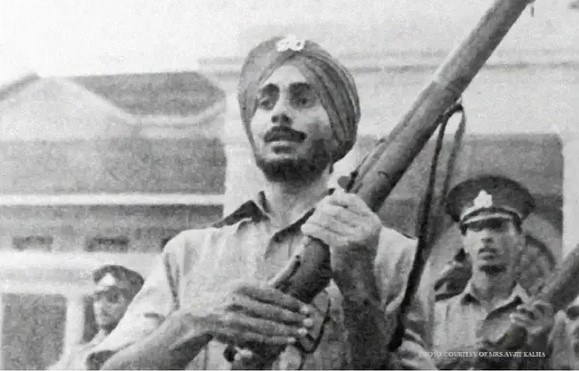Daljit Singh Kalha
Royal Indian Army Service Corps (RIASC)
Captain Daljit Singh Kalha, an officer in the Royal Indian Army Service Corps (RIASC), was captured with his comrades in Tobruk on 28 June 1942 by the Germans. After two days without food, the PoWs were entrusted to the Italians, who moved them to Benghazi and then to Bari, in an unspecified transit camp. Finally, Daljit was transferred to PG 63 Aversa, near Naples. Even though this camp was in the south of Italy, during the winter temperatures fell sharply. Many PoWs captured in Africa wore only their battledress, ill-suited to face the cold. Moreover, the camp lacked blankets. The food was also scarce, and the prisoners had to rely on Red Cross parcels. After the Allied landings in Sicily in the summer of 1943, the area was heavily bombed by the Allies, and the PoWs were transferred to PG 91 Avezzano.
Daljit Singh Kalha, circa 1940.
Fonte: Archivio MSMT
Here, Daljit started thinking about running away, also thanks to the contacts he had established with a friendly Italian, Domenico Fabriani, who worked as a repairman in the camp. Domenico warned him that the Germans wanted to deport all the prisoners in the camp and taught him some rudimentary Italian. Daljit learned the language fairly well and ended up being the interpreter of the Italian camp’s doctor, Mr Boccaletti. Both Boccaletti and Domenico were part of a network which helped Allied PoWs escape and cross the front line to return to Allied territory.
In September 1943, Daljit attempted to escape for the first time. Thanks to a distraction provided by other PoWs, who started chatting with the guards, Daljit and Lt. Sandhu cut a hole in the camp’s fence and escaped. However, Sandhu soon fell ill, and the escape failed. The Germans recaptured the two and brought them back to the camp, where they were tortured and put in solitary.
However, this did not discourage the two officers, who, thanks to Boccaletti’s collaboration, were taken to a nearby hospital run by nuns. The nuns welcomed the PoWs and helped them with their escape plan. Daljit and Sandhu had to take off their Sikh turbans, shave their beards and long hair, and dress in civilian clothes to better blend with the local population. Another group of Italians came to pick them up at the hospital with bicycles. Due to them, the two managed to elude the German surveillance, reaching the village of Luco dei Marsi (L’Aquila), where Domenico lived.
Thanks to the local population’s support, the two could stay in the area, changing their hideouts frequently. Those included a barn to find shelter from the cold, a cave where the locals kept their calves, and, lacking anything better, even the woods. Despite the constant presence of enemy patrols in the area, on the hunt for escaped PoWs, the population fed and protected them. Like many Indian escapees, Daljit and Sandhu decided not to leave their hideout, thinking their appearances would quickly betray them. The two lived in this way for nine months until the Allies managed to overrun Luco dei Masi in their advance. Daljit was thus able to return home, to India, in July 1944, after two harsh years in Italy, which had made him acutely nostalgic about home. As he noted: «this long period of captivity makes me say how it is almost impossible to imagine what home life is like. How I want to get under eastern skies again».
Related camps
Sources
- MSMT: https://archives.msmtrust.org.uk/pow-index-2/kalha-daljit-singh/
-
Roger Absalom, L’alleanza inattesa. Mondo contadino e prigionieri alleati in fuga in Italia (1943-1945) (Bologna: Pendragon, 2011).


Daljit Kalha was my grand uncle and we heard wonderful stories from our Dad – Jasraj Kalha ( eldest child of the Kalha Clan)